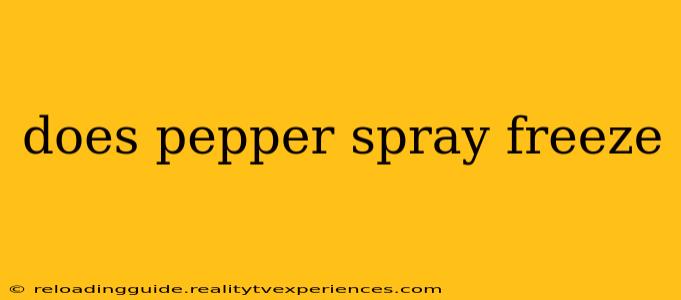The question of whether pepper spray freezes is a crucial one for anyone who carries it for self-defense, especially in colder climates. The answer isn't a simple yes or no, but rather depends on several factors, including the specific formulation of the pepper spray, the temperature, and the duration of exposure to cold.
How Temperature Affects Pepper Spray
Pepper spray, or oleoresin capsicum (OC) spray, is a mixture of capsaicinoids (the active ingredient responsible for the burning sensation), an oil base, and a propellant. The behavior of these components at low temperatures is key to understanding how cold affects the spray's functionality.
Freezing Point: While the exact freezing point varies based on the specific formulation, many pepper sprays will begin to thicken and lose their effectiveness below freezing (0°C or 32°F). The oil base is particularly susceptible to thickening, hindering the spray's ability to atomize properly. This means that instead of a fine mist, you might get a sputtering, less effective stream.
Propulsion Issues: The propellant, usually a compressed gas like CO2 or a blend of gases, is also affected by cold temperatures. Lower temperatures can reduce the propellant's pressure, making it harder to expel the spray. In extreme cold, the propellant might fail to work altogether.
Capsaicinoids: The capsaicinoids themselves are relatively stable at low temperatures, but their effectiveness is reduced if the spray doesn't atomize properly. A less effective spray means a lower concentration of capsaicinoids reaching the target.
What Happens When Pepper Spray Freezes?
When pepper spray freezes, it essentially becomes unusable. The thick, congealed substance will likely not spray properly. Even if you manage to expel some of the contents, the reduced atomization significantly limits its effectiveness. The cold will also numb the skin, potentially reducing the immediate effects of the spray.
Practical Considerations for Cold Weather Use
If you live in or frequently travel to areas with freezing temperatures, understanding the limitations of your pepper spray is critical. Here are some things to consider:
1. Choosing Cold-Weather Formulas:**
Some manufacturers produce pepper spray specifically formulated for cold weather performance. These formulations often utilize different propellants or oil bases designed to remain effective at lower temperatures. Check the product labeling to see if it's suitable for cold environments.
2. Storage and Carry:**
Keeping your pepper spray in a warm pocket close to your body can help mitigate the effects of cold. Avoid storing it in an exposed area, like a vehicle's glove compartment, where it's susceptible to freezing.
3. Regular Testing:**
In cold weather, regularly test your pepper spray's functionality. This isn't about spraying it indiscriminately but rather ensuring it's still dispensing correctly. Practice deploying the spray in a controlled environment to ensure it's working as intended.
Disclaimer: This information is for educational purposes only and should not be considered professional advice. Always follow the manufacturer's instructions and exercise caution when handling pepper spray. Improper use of pepper spray can have serious consequences.

